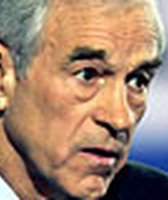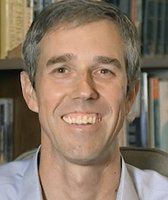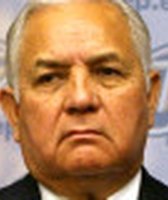Get PolitiFact in your inbox.
Law didn't muzzle or censor Ron Paul for cooling-off year after he left House
Was the some-would-say-irrepressible Ron Paul of Texas muzzled for a year?
So the former congressman and past presidential candidate wrote in a Jan. 14, 2014, email blast soliciting contributions to Campaign for Liberty, a political group.
"You may not know this…," the email opened. "But for the past year, I was censored. Believe it or not, federal rules governing former members of Congress for their first year after retirement limited my ability to mobilize Americans to advance liberty."
Paul, whose last day in the House was Jan. 3, 2013, wrote: "Every communication had to be carefully crafted, and often even double-checked by C4L’s lawyers, to make sure I didn't violate federal law. But as of January 4th, the muzzle has been removed!"
Paul’s email included a postscript beginning: "Due to my retirement from Congress, federal law has restricted what I could say and do for the past year. But the muzzle's been removed--and I'm now free to speak my mind."
In the email, Paul proclaimed a 10-day "Freedom Bomb" with the goal of flooding Congress with 20,000 "Defend Liberty Directives" letting every member "know the R3VOLUTION is alive and well." Paul wrote, too, that the effort’s priority would be forcing the Senate to vote on a proposal to audit the Federal Reserve.
Group cites House rules
We asked Campaign for Liberty, which says it is devoted to promoting "individual liberty, constitutional government, sound money, free markets and a noninterventionist foreign policy," to illuminate how Paul was censored and muzzled for a year.
By email, an unidentified staff member said Paul "was not allowed to talk about certain things during the past year because of House Ethics Rules. This requires that you stay quiet about certain things for 1 year after your retirement from the House of Representatives."
The staff email included a web link to a document, revised in January 2012, presenting highlights of the House’s ethics rules and a section titled "Post-Employment Restrictions," which the section says apply to House members.
According to the section, for one year after leaving office, a member may not communicate with or appear before a member, officer or employee of the House or Senate or any legislative branch office with "intent to influence official action on behalf of anyone else." Also, according to the section, a member "may not represent or advise a foreign government or a foreign political party" or "represent oneself, a state or local government, or the U.S. government as an official or employee of a government agency or entity." Finally, according to the section, a member "may not lobby the staff of a member in lieu of lobbying the member directly." Violations of the prohibitions, the section says, are felonies punishable by fines and/or imprisonment.
Experts say restriction doesn't leash free speech
We spotted nothing there about being leashed from speaking your mind or coaxing others to do so.
Experts agreed.
Attorney Kenneth Gross, former associate general counsel of the Federal Election Commission, told us by email that Paul was restricted for one year under the standard one-year "cooling off" period for all House members and senior staff; senators face a two-year limit. "During that time," Gross said. "a former member may not appear before Congress on substantive matters but that restriction does not prohibit public appearances." By email, another expert, attorney Brett Kappel, who specializes in campaign-related laws, agreed with Gross’ analysis.
Featured Fact-check
Melanie Sloan of Citizens for Responsibility and Ethics in Washington, which says it promotes ethics and accountability by targeting government officials who sacrifice the common good to special interests, told us by phone the one-year restriction could extend to keeping Paul and other former House members from lobbying members by testifying before a committee.
Then again, Sloan said, members could still be invited to offer their views on topics. By email, she noted a May 12, 2010, report by the advisory non-partisan Congressional Research Service stating: "The prohibition goes only to advocacy-type of communications, that is, communications ‘with the intent to influence’ a member or officer or employee of the legislative branch concerning "any matter on which such person seeks official action" by that member, officer or employee, or by either house of Congress. There are also several specific exceptions to the general prohibition, including, for example, exceptions for lobbying and advocacy work for state or local governments, testifying on matters under oath, and generally for representations or communications on behalf of political candidates, parties and political organizations."
Upshot: A former House member must take a year off from advocating positions on issues with members of Congress. Sloan and Gross each said, though, that former House members aren’t restricted from generally speaking out.
Paul, Gross said, "was permitted to make public appearances and espouse views. However, he was restricted in making one-on-one appearance(s) before and lobbying members of Congress and staff."
After reading a portion of Paul’s email blast, Sloan commented by email: "From the missive, it appears Paul does have legislative interests. If he wanted to personally lobby Congress on these issues, he was prohibited from doing so for the past year... Sending emails to supporters trying to galvanize them around issues like auditing the Fed isn’t lobbying and would be permissible. So the concept that every word in these emails had to be reviewed by lawyers to comply with the lobbying ban is nonsense."
Sloan said in a follow-up email: "I have trouble imagining what Paul wanted to do that he couldn’t do--if he wanted to write op-eds, appear on television, or have speaking engagements, all of that would have been allowed."
Paul spoke out during year
A search for news stories using the Nexis news database gave indications that Paul often aired his views in the year at issue.
On April 23, 2013, Paul gave an interview to Bloomberg News covering the value of the dollar and also touching on his views of the bitcoin and immigration laws. On June 10, 2013, Paul gave thanks for leakers of documents revealing the government’s eavesdropping efforts, according to a CNN news blog post. A day later, Paul said in a telephone interview on Fox Business News that the government might kill leaker Edward Snowden with a missile. On CNN’s Aug. 15, 2013, "Situation Room," Paul questioned New Jersey Gov. Chris Christie’s qualifications to be president and said his son, Sen. Rand Paul, R-Ky., was prepared to be president. His comments also touched on his concerns about central economic planning by the Federal Reserve. On Sept. 19, 2013, Paul appeared on MSNBC’s "Morning Joe," offering his interpretation of an announcement by Ben Bernanke, chairman of the Federal Reserve.
An Oct. 1, 2013, US News news story quoted Paul describing the temporary government shutdown as "less of an event than everyone’s claiming it to be." Paul said generally: "Republicans and Democrats are basically in agreement with authoritarianism. They believe that one way or another you have to be an authoritarian, to tell you how to spend your money [and] both of them tell you how to run your personal life. And they're both very excited about telling every country what to do, and giving them money if they behave or bombing them if they don't."
In the year, Paul also helped launch the online RonPaulChannel, telling the Washington Times for a news story posted Aug. 8, 2013: "It will give me an opportunity to talk about the issues I've been talking about for 30 years. But it's in a different format. I won't be cut off from my subscribers because we plan to take their questions through email, interview individuals and go in-depth." The story quoted Paul as saying that the channel had pulled in 200,000 subscribers within hours of a publicity announcement that week, drawn by his personal guarantee they would not confront censors, or the "games and lies" of traditional broadcast and cable channels.
The channel’s website has about 40 taped video messages from Paul that were placed online before the one-year cooling-off period ended, starting with an Aug. 15, 2013, commentary on Egypt and the United States extending to a Jan. 2, 2014, commentary on Iran sanctions.
Our attempt to reach a spokeswoman for Campaign for Liberty about our findings was unsuccessful.
Our ruling
Paul said he was censored and muzzled for the year after he left the House.
That's not factually supported. Far as we could tell, in contrast, Paul freely voiced his views on issues in most every way possible during the year, though he was barred, as a former member, from directly lobbying lawmakers.
We rate this claim as False.
Our Sources
Emails, Kenneth Gross, partner, Skadden, Arps, Slate, Meagher & Flom, and Brett Kappel, counsel, Arent Fox, Jan. 21, 2014
Telephone interview and emails (excerpted), Melanie Sloan, executive director, Citizens for Responsibility and Ethics in Washington, Washington, D.C., Jan. 22-23, 2014
Report, "Post-Employment, 'Revolving Door,' Laws for Federal Personnel," Congressional Research Service, May 12, 2010 (accessed Jan. 23, 2014)
Browse the Truth-O-Meter
More by W. Gardner Selby
Law didn't muzzle or censor Ron Paul for cooling-off year after he left House
Support independent fact-checking.
Become a member!
In a world of wild talk and fake news, help us stand up for the facts.













































